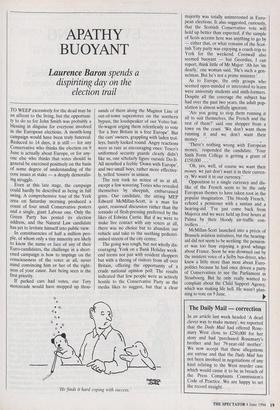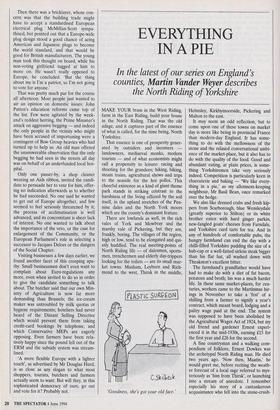APATHY BUOYANT
Laurence Baron spends a
dispiriting day on the election trail
TO WEEP excessively for the dead may be an affront to the living, but the opportuni- ty to do so for John Smith was probably a blessing in disguise for everyone involved in the European elections. A month-long campaign would have been truly funereal. Reduced to 14 days, it is still — for any Conservative who thinks the election on 9 June is actually about Europe, or for any- one else who thinks that votes should in general be exercised positively on the basis of some degree of understanding of the core issues at stake — a deeply demoralis- ing struggle.
Even at this late stage, the campaign could hardly be described as being in full swing. A comprehensive tour of the York area on Saturday morning produced a count of four small Conservative posters and a single, giant Labour one. Only the Green Party has posted its election address, and the Natural Law candidate has yet to levitate himself into public view.
In constituencies of half a million peo- ple, of whom only a tiny minority are likely to know the name or face of any of their Euro-candidates, the challenge in a short- ened campaign is how to impinge on the consciousness of the voter at all, never mind convincing him or her of the right- ness of your cause. Just being seen is the first priority.
If parked cars had votes, our Tory motorcade would have mopped up thou- sands of them along the Maginot Line of out-of-town superstores on the northern bypass, the loudspeaker of our Volvo bat- tle-wagon urging them relentlessly to vote `for a free Britain in a free Europe'. But the cars' owners, grappling with laden trol- leys, barely looked round. Angry reactions were as rare as encouraging ones: Tesco's uniformed security guards clearly didn't like us, one scholarly figure outside Do-It- All mouthed a feeble 'Down with Europe', and two small boys, rather more effective- ly, yelled 'tossers' in unison.
The rest took no notice of us at all, except a few wavering Tories who revealed themselves by sheepish, embarrassed grins. Our candidate, the sitting MEP Edward McMillan-Scott, is a man for quiet, reasoned discussion rather than the tornado of flesh-pressing preferred by the likes of Edwina Currie. But if we were to make live contact with any voters at all, there was no choice but to abandon our vehicle and take to the seething pedestri- anised streets of the city centre.
The going was tough, but not wholly dis- couraging. York on a Bank Holiday week- end teems not just with resident shoppers but with a throng of visitors from all over Britain, offering the opportunity of a crude national opinion poll. The results indicated that few people were as actively hostile to the Conservative Party as the media likes to suggest, but that a clear `He finds it hard coping with success.' majority was totally uninterested in Euro- pean elections. It also suggested, curiously, that the Scottish Conservative vote will hold up better than expected, if the sample of Scots accents here was anything to go by — either that, or what remains of the Scot- tish Tory party was enjoying a coach-trip to York for the weekend. Cornwall also seemed buoyant — but Geordies, I can report, think little of Mr Major: `Ah luv 'im dearly,' one woman said. 'He's such a gen- nelman. But he's not a prime minister.'
As to Europe, the only groups who seemed open-minded or interested to learn were university students and sixth-formers. Despite all the coverage the subject has had over the past two years, the adult pop- ulation is almost wilfully ignorant.
`Are you going to stop them running it all to suit themselves, the French and the rest of them?' said one shopper from a town on the coast. 'We don't want them running it and we don't want their money . . .
`There's nothing wrong with European money,' responded the candidate. 'Your Sixth Form College is getting a grant of £150,000 . . . '
`Oh, yes, well, of course we want their money, we just don't want it in their curren- cy. We want it in our currency.'
Opposition to a single currency and dis- like of the French seem to be the only European themes to have taken root in the popular imagination. 'The bloody French,' echoed a pensioner with a suntan and a hearing-aid. 'I've just come back from Majorca and we were held up four hours at Palma by their bloody air-traffic con- trollers . . . '
McMillan-Scott launched into a precis of Brussels aviation initiatives, but the hearing- aid did not seem to be working: the pension- er was too busy enjoying a good whinge about France. Soon he was drowned out by the insistent voice of a Selby bus-driver, who knew a little more than most about Euro- politics because he had once driven a party of Conservatives to see the Parliament in Strasbourg. But he only really wanted to complain about the Child Support Agency, which was making life hell. He wasn't plan- ning to vote on 9 June. Then there was a bricklayer, whose con- cern was that the building trade might have to accept a standardised European electrical plug. McMillan-Scott sympa- thised, but pointed out that a Europe-wide plug design stood a good chance of acing American and Japanese plugs to become the world standard, and that would be good for British manufacturers. The young man took this thought on board, while his non-voting girlfriend tugged at him to move on. He wasn't really opposed to Europe, he concluded. 'But the thing about me is I'm a patriot, so I'm not going to vote for anyone.'
That was pretty much par for the course all afternoon. Most people just wanted to air an opinion on domestic issues: John Patten's education reforms came top of the list. Few were agitated by the week- end's reddest herring, the Prime Minister's attack on aggressive begging — and indeed the only people in the vicinity who might have been accused of importuning were a contingent of Bow Group heavies who had turned up to help us. An old man offered the unanswerable observation that the only begging he had seen in the streets all day was on behalf of an underfunded local hos- pital.
Only one passer-by, a shop cleaner wearing an Aids ribbon, invited the candi- date to persuade her to vote for him, offer- ing no indication afterwards as to whether he had succeeded. No one said he wanted to get out of Europe altogether, and few seemed to feel seriously threatened by it; the process of acclimatisation is well advanced, and its concomitant is sheer lack of interest. No one wanted to talk about the importance of the veto, or the case for enlargement of the Community, or the European Parliament's role in selecting a successor to Jacques Delors or the dangers of the Social Chapter.
Visiting businesses a few days earlier, we found another facet of this creeping apa- thy. Small businessmen don't even want to complain about Euro-regulations any more, even when invited to do so in order to give the candidate something to talk about. The butcher said that our own Min- istry of Agriculture is now far more demanding than Brussels; the ice-cream maker was untroubled by milk quotas or hygiene requirements; hoteliers had never heard of the Distant Selling Directive which would prevent them from taking credit-card bookings by telephone, and which Conservative MEPs are eagerly opposing. Even farmers have been rela- tively happy since the pound fell out of the ERM and the subsidy system was stream- lined.
'A more flexible Europe with a lighter touch', as advertised by Mr Douglas Hurd, is as close as any slogan to what most shoppers, tourists, butchers and farmers actually seem to want. But will they, in this sophisticated democracy of ours, go out and vote for it? Probably not.



























































 Previous page
Previous page